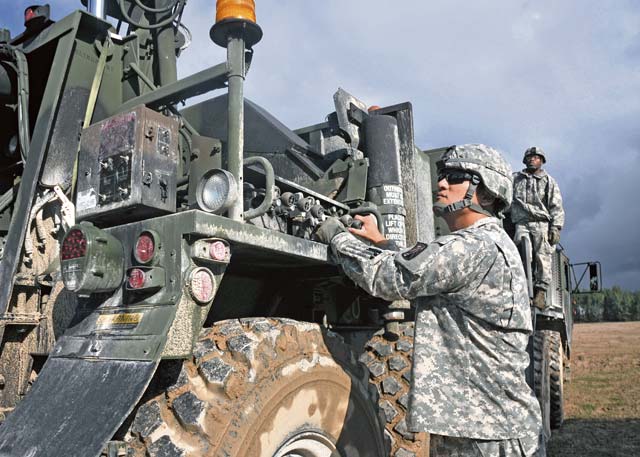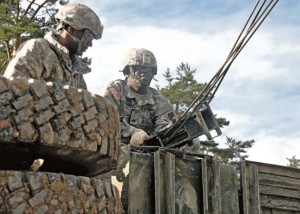
Twenty mechanics from the 21st Theater Sustainment Command faced broken and overturned vehicles during a three-week course designed to help them recover damaged, stuck and otherwise immobilized vehicles.
The Wheeled Vehicle Recovery Course at the Grafenwöhr Training Area began Sept. 9 and concludes today.
Mobile Training Team instructors traveled to Grafenwöhr from Fort Lee, Va., to give the students hands-on training on how to safely and properly recover vehicles in a multitude of scenarios using Army recovery vehicles, or wreckers.

“We train all of these Soldiers on recovering during catastrophic events, such as a vehicle rollover, a vehicle stuck in the mud or a broken down vehicle,” said Staff Sgt. Kevin Melvin, an MTT instructor with the Track, Metalworking and Recovery Department, 16th Ordnance Battalion out of Fort Lee.
Soldiers are taught how to “get the equipment out safely without causing damage to the Soldier or more damage to the equipment,” he said.
“I think the training is great,” said Spc. Noel Wint, a wheeled vehicle mechanic, with Headquarters and Headquarters Company, 18th Military Police Brigade. “I’ve never messed around with wreckers before, and I’m getting a lot of hands-on, and I love it.”
A large part of the success of the training goes with the extensive knowledge that each instructor brings to the course as well as the diverse nature of placing 20 mechanics with different skill levels together.
“The instructors are very knowledgeable in their jobs, and they know a lot about recovery,” Wint said. “All the mechanics have a different level of experience. We are learning from each other, and I like that kind of learning.”
Even though the course instructed students on various recovery methods for just about any situation they may encounter in real life, Melvin continuously emphasized the large role towing plays in any recovery operation.
“Towing is one of the most important things that we teach because 90 percent of recovery is towing,” Melvin said. “Whether a vehicle broke down, rolled over or stuck in the mud, and if you’re in a combat situation, you don’t have the time to evaluate it. You’re going to hook it up to your wrecker and you’re going to tow it back to the (Forward Operating Base) and get it fixed so it can get back into the fight.”
Safety is particularly important due to the nature of the training. Instructors emphasize it throughout the course in order to minimize risk to the students who are often operating large and complex machines while performing recovery operations.
“Safety is an important part of this course,” said Sgt. Ray Christian, a senior mechanic with HHC, 21st TSC. “There’s a lot of pinch points, so if you’re not beings safe there’s a high risk that there will be a casualty.”
“Anyone can go out and play with the controls on a wrecker,” Melvin said. “But we show them how to do it safely and correctly without causing any more damage. That way the vehicle can get back into the fight.”
Students agreed the course is a valuable tool for any mechanic. Transportation efforts are key to operational success in a combat environment and recovery operations play a vital role in that success.
“If you’re a mechanic, I would definitely recommend this training, because you learn about the trucks and why they use certain things for recovery,” said Spc. Lydwina Davis, a wheeled vehicle mechanic with HHC, 21st TSC. “When a truck gets tipped over or even stuck, they call us to go get it. The faster you get it done, the faster we can transport people, food, water, whatever the mission may be.”


